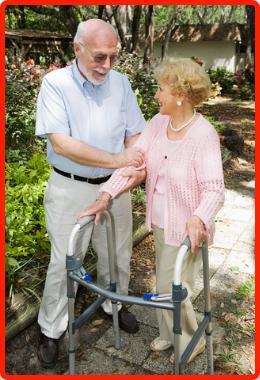|
 |
||||||||||||||||
Our Joint Decisions feels caregivers have five major stages in their support of the patient. Since they all begin with "C," we refer to them as the 5-Cs for Caregivers. They are as follows:
Below, we are going to take a closer look at each stage. |
|||||||||||||||||
|
|||||||||||||||||
A patient's health condition creates caregivers from family or friends. Caregivers emerge by choice or they're the only one available. In either case, being a caregiver can be a daunting task. Yes, it can be frustrating, demanding & seem thankless. The other side is the joy we get from seeing our efforts improve a patient's quality of life. As a caregiver, we gain great insights into ourselves. Being a caregiver is quite rewarding while continually challenging. The first & most important stage for a caregiver is to be a catalyst for the patient to make the best "Joint Decision." This means convincing the patient to get medical help to determine diagnosis. Then, the caregiver needs to insure the patient follows-through on the necessary steps to achieve pain-free mobility, from rehabilitation, surgery to total replacement. Being an effective catalyst is the most important of all stages. If the patient lives in pain & seeks no positive outcome, the procrastination will cause greater damage. Being a catalyst requires a caregiver to motivate the patient to do what is best for them & everyone around them. The caregiver, instilling a positive attitude of hope & healing within the patient is essential. The Catalyst Stage sets the foundation for success. |
|||||||||||||||||
|
|||||||||||||||||
|
|||||||||||||||||
Being a cheerleader requires the caregiver to inspire, encourage & strengthen the patient to do their best to achieve pain-free mobility. Sometimes, it can seem you are cheerleading your team when the score shows no hope of winning. There is only one team, the patient, caregiver, family, friends & the medical team. The caregiver needs to deflect any & all negative influences to bring a positive spirit of hope & healing to the patient. The caregiver does not have pom-poms, but they need to bring every ounce of inspiration & motivation to the patient. Yes, this can be very difficult. If possible, solicit the support of other caregivers in the patient's life to insure stronger support. |
|||||||||||||||||
Establishing a caregiver team is the ideal solution to provide the best possible support for the patient. In this way, no one caregiver is responsible 24/7. This allows multiple caregivers that will give more diversity to the patient's life while keeping caregivers much stronger. A caregiver team also allows for excellent discussions on how to handle any challenge that may arise, not placing all the responsibility on one person. |
|||||||||||||||||
|
|||||||||||||||||
|
|||||||||||||||||
|
|||||||||||||||||
A caregiver's commitment to support the patient to better health is a tremendous responsibility. Many times family members will state their own family, work or other reasons that keep them from being a caregiver. Compassion is the key ingredient that makes a successful & committed caregiver. Compassion drives the caregiver to overcome any obstacle or rationalization that may deter them from the support the patient needs to achieve a higher quality of life. |
|||||||||||||||||
Compassion is vital for the caregiver's endurance. Understanding the patient's suffering & wanting to do something about it is the core behind being a successful caregiver. Compassion tightens the caregiver's focus when frustration & anger are brewing. Compassion breaks down the caregiver's walls of despair to see the support the patient needs for a higher quality of life. |
|||||||||||||||||
Coaching the patient requires the caregiver to teach, supervise & enlighten the patient to take ownership for their own health. Many times, we feel we are a coach over a player who does not even want to participate. Coaching requires getting the patient to understand this is their life & they are the only ones who can improve it. Coaching can be the most challenging of the five stages. How do you convince a patient they need to take ownership of their life when they may appear to not care? Getting the patient to understand the value of their own life to themselves & others is the key. Focus on what the patient has achieved & the value they bring to all those around them. Coaching the patient to follow-through on their best "Joint Decision" brings them to accept the diagnosis & follow-through with the procedure to improve their life. |
|||||||||||||||||
|
|||||||||||||||||
The caregiver must first care for themselves to have the greatest value to the patient. Being a 24/7 caregiver is of no value to the patient or the caregiver. The caregiver must insure they have others who can relieve them so they can continue to live their life & maintain their physical, mental, emotional & spiritual health. |
|||||||||||||||||
Disclaimer | Privacy Policy | Contributions | Sitemap | Licensing | Banners | Webmaster Copyright © 2012 Our Joint Decisions, Inc. NFP An Illiniois Not-for-Profit Corporation, 501(c)(3) Pending |
||
| Home |  |
caregivers |  |
caregiver'sstages |
Website Location:
Welcome to Our Joint Decisions, Inc. NFP



"Helping Those Seeking Help & Those Who Feel Helpless!"
